Social media and dynamic web sites are failed experiments
So one of my favourite podcasts went into radio silence. I am of course talking about Hacker Public Radio, a free culture and technology oriented podcast, to which I have contributed a few episodes, in the spirit of listener generated content. I haven’t done a podcast in a while, spending more time in the real world, taking a break from tech and getting back to basics and messing around with my bicycles. I still tuned in once in a while, which is how I came to learn through other sources that I was no longer able to download any new episodes due to the fact that the Internet Archive was hacked. The Internet Archive is the server where episodes of hacker public radio were served from.
I started by going through all of my episodes and making them as small as possible, and then I uploaded all of these episodes up here to my own server at https://paulquirk.ca/podcasts with a new podcast called HPR-emergency-podcast.mp3. I then logged into my Mastodon account and made a reply to the HPR Podcast Mastodon account message @hpr@botsin.space where they announced the Internet archive going through a DDOS attack.
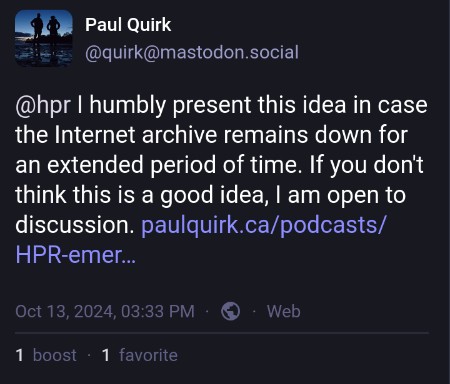
My suggestion was received well, though they seem to now want others to mirror the HPR site on other home servers which is beyond the capabilities of my static low power web server. But then things got weird when someone jumped in and went on a 3 post rant about how much he hates media like podcasts with this being the height of vanity. Doesn’t even consider the context of what I am trying to accomplish, and immediately tries to make it about him and his neurodivergence.
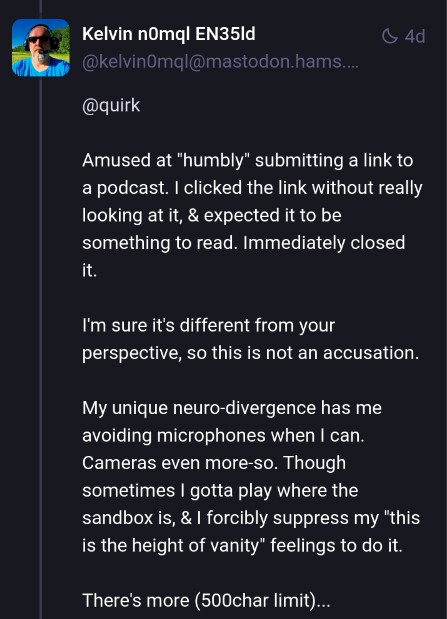
For someone who avoids cameras and microphones, yet spends his free time in front of a screen and speakers clicking on random links posted by complete strangers with a profile picture of him wearing headphones and a microphone attached to his head, I’m guessing he’s never heard of books, or maybe he’s some sadomasochist, but whatever his neurodivergence is, the fediverse certainly isn’t doing his mental health any favours. I gently explained to him that HPR was a podcast.
After that, this showed up in my newsfeed.

There’s some pretty strong language here. A person calling themselves Kat wants me and others to believe that Richard Stallman, the founder of the Gnu Public Licence that is the foundation of Linux and much of the open source software world, has done something so terrible that he needs to “Suffer Consequences” beyond the spreading awareness of this thing he has done. These consequences would be so severe that “No one would dare act like them again, famous or otherwise.” This implies pretty severe consequences. What exactly are we talking about here for consequences? Are they going to have Richard Stallman drawn and quartered? Broken on the wheel? Cement boots? Sent to a work camp in Siberia? Historically, these were solutions that were used in society whenever someone who was deemed a criminal needed to be made an example of so that “No one would dare act like them again.” So I had to know.
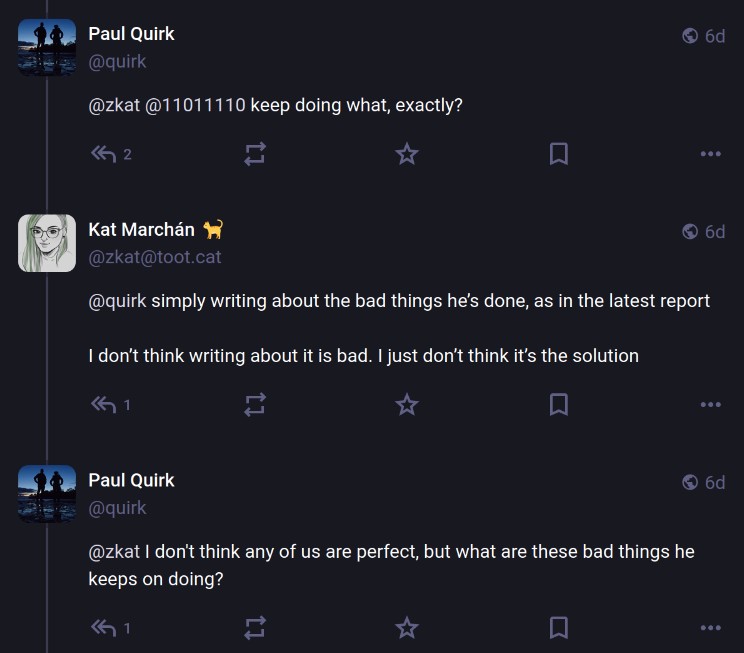
I ask Kat directly for clarification of what Stallman had done that’s so terrible. Instead of answering my question, Kat reiterated that simply writing about the things he has done isn’t enough, how something more has to be done. So I pointed out that I didn’t think anyone was perfect, and asked once again for clarification. The response?
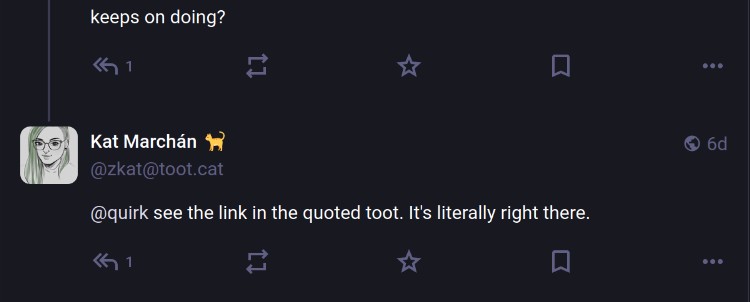
I find it very disingenuous whenever someone cannot directly just answer a simple question and instead force me to click on a link to a separate site for the answer, but I did, and what I found was a hit piece on Richard Stallman written by anonymous authors.
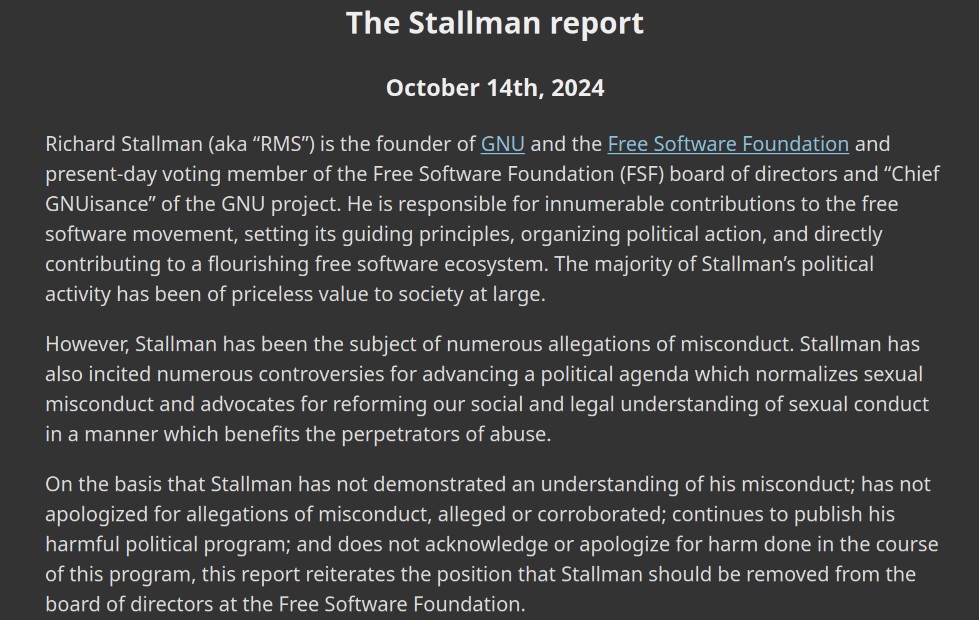
Based on allegations, as well as their own interpretation of controversial things that Stallman had posted on his personal website, they have decided that Richard Stallman needs to issue a detailed retraction of the things he posted that others found offensive, apologize to anyone who was offended by his political views, remove all political notes and articles he has on his website, and to step down from the very thing he created. But it doesn’t end there. They also want specific members and directors to also step down; namely, Alexandre Oliva, Geoffrey Knauth, Gerald Sussman, and Henry Poole. They also want anyone who has “Platformed” Richard Stallman to issue a written apology.
The last time a group of anonymous people were offended by political views of freedom and decided they would be judge and jury while remaining anonymous, they covered their faces with pointy white hoods. But this is not why these people are wrong. To paraphrase a quote often attributed to Voltaire, I disagree with what Stallman says, but I will defend to the death his right to say it, and that is for the following ethical reasoning:
-
These ideas and their reasoning did not originate with Richard Stallman, nor is he the only person expressing them. Considering his views on pedophilia as an example, in cultures within countries like Ethiopia, Brazil, Nigeria, Bangladesh, and India, pedophilia had been normalized with older adult men taking girl child brides.It should come as no surprise that countries where pedophilia has been normalized are also countries that restrict or curtail the freedom of speech. It is clear that the problem of pedophilia has arisen independently many times spanning various cultures for millennia. Cancelling Richard Stallman on this matter does not and will not make this problem go away, no matter how harsh the punishment; in fact, it may make the problem worse.
-
When you start to cancel people for expressing bad ideas, you force those bad ideas underground, where they can spread unchallenged. Worse, someone could arrive at these bad ideas on their own without any external influence and, not understanding they’re doing anything wrong, could act on those ideas. By allowing bad ideas like pedophilia to be expressed publicly, we can challenge them publicly, so that a person who comes to a similar idea can come to learn and understand the full consequences to the life of a child from their perspective before acting on their beliefs. Demonizing Richard Stallman will not result in “No one daring to act like them again,” it only motivates them or people like them to come up with ways to hide it better as they imagine ways to justify their behaviour in the echo chamber of their own mind or group of like minded people, resulting in them acting on these beliefs in secret, resulting in greater trauma or even death to the victims. This will make this problem even more difficult to deal with.
-
When you make something taboo to even talk about, it has a backlash effect of making it even more desirable, turning it into the proverbial forbidden fruit. It becomes exciting and thrilling to those attracted to the idea. By allowing people to talk about pedophilia openly, we can use our own freedom of speech to ridicule it and expose it for the disgusting, degenerate behaviour that it is, belittling it at every opportunity so that those who might think about it will feel a sense of disgust for having such thoughts. A good example of how using freedom of speech to defeat bad ideas was demonstrated in how Superman defeated the Klu Klux Klan.
So those are the principal reasons why I believe freedom of speech needs to be protected in this example, which takes me to my main point.
- By creating the GPL, Richard Stallman has had to have a very strong sense of fighting for our individual rights. One of the rights he enjoys as an American is the right to freedom of speech. One of the ways to test your right to free speech is to use it to present an idea that is controversial or offensive to most people. The freedoms the GPL gives us stems from the right of freedom of speech. That’s the reason why software licensed under the GPL is said to be “Free as in ‘free speech’, not as in ‘free beer.’” If we allow people who would want to punish a man for using his freedom of speech to take over the GPL, then the GPL will be in the hands of those who are inherently against the spirit and the soul of the GPL.
Thus, the solution to Stallman’s free speech is more free speech. Yes, Kat; writing about the things he has written about is actually the only solution that is necessary. And so I replied the following, which got me blocked by Kat and my reply removed:
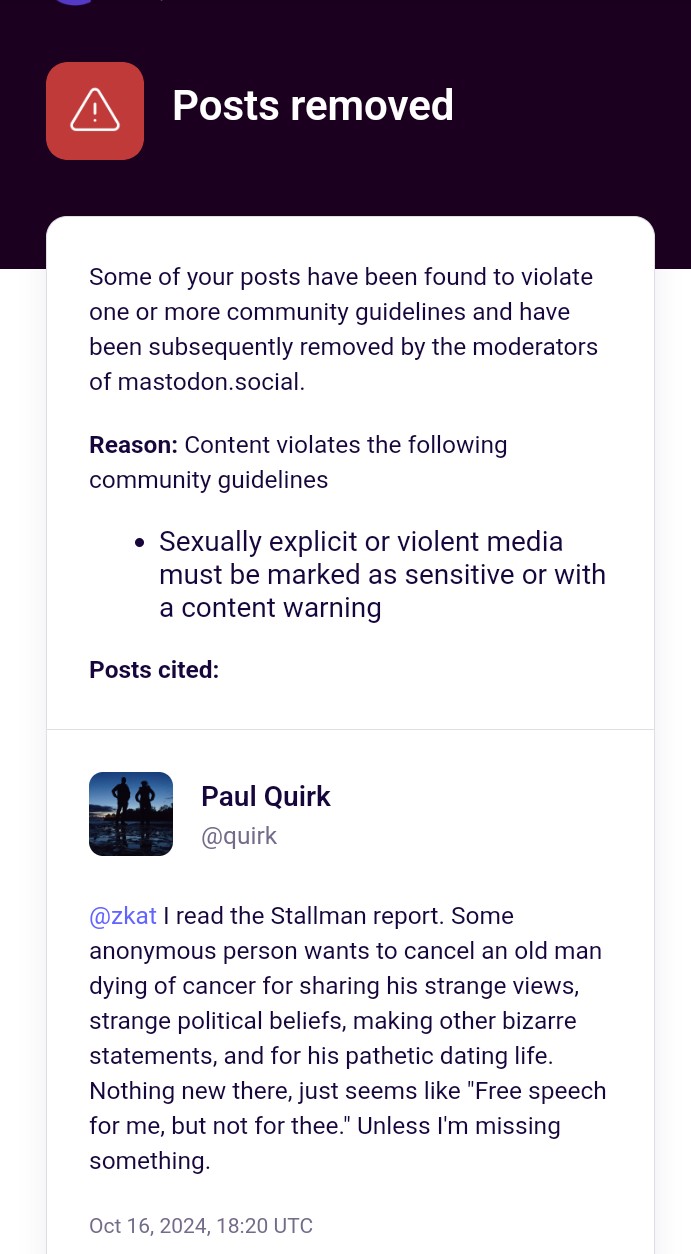
And that’s when it hit me. The realization that the Fediverse is not the answer to the problems of centralized social media; that social media is, in fact, the problem. What we have in the Fediverse is a place where everyone gets to play the role of a petty tyrant. Anyone can see there is absolutely nothing objectively or even subjectively sexual or violent about my reply. Sure, I can spin up my own instance, but the moment I challenge someone’s idea with a dissenting idea, they can and will block me, and the way these instances are set up, the owners can block me from everyone using their instance. So Mastodon is no better than Facebook or Twitter when it comes to censorship; it’s just a different kind of censorship for people who are not beholden to anyone or anything but their ideologies.
The problem of this becomes obvious; once dissenting opinions are no longer permitted, we create an echo chamber of like minded individuals in order to give bad ideas life. Mastodon, the Fediverse, social media are corrosive to the fundamental principals of free speech, and by extension are therefore corrosive to the GPL and the very nature of free and open source software.
Based on these observations, I have arrived at the conclusion that there really is only one solution, and that is a web site running from one’s own server, which is running an operating system licensed under the GPL. We can literally seize the means of production. The Internet and World Wide Web are still inherently democratic, even if the corporate owned search engines are not. I’m done with the games people play on their servers, with them clearly trying to manipulate me and others to the narrative of their ideology. Those of us who champion the ethical and moral benefits of free speech owe it to those values to express ourselves and our ideas from our own servers. I believe a static web site is best because, if the Internet archive has taught us anything, it’s that there will always be tyrants and enemies of free speech who want to take our rights away. A static web site is, from what I can tell, the only type of web site that can be made nearly unhackable, and in the event of a hack, is very easy to put back up at another location.
This article, and the images accompanying it, are licensed under the GPL version 3.0. Feel free to copy and repost as you see fit.